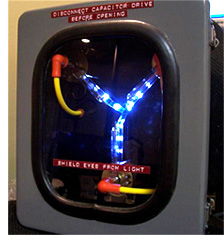
I posted this pic first !!! I win
Posted on 09/01/2010 1:34:35 PM PDT by LibWhacker
If optimized, this new technology could fully charge consumer electronic devices almost instantaneously.
Drawing on the layered design of tear-inducing onions, scientists have created a new super capacitor that is powerful enough -- and cheap enough -- to replace the larger, heavier capacitors used in consumer electronics such as computers and cells phones.
If commercialized, the new super capacitor could be fully charged in a second and, coupled to a normal battery, provide enough energy to power a cell phone for weeks or a laptop battery for days.
"If you open any computer, you will see a lot of these small, cylindrical round capacitors," said Vadym Mochalin, a scientist at Drexel University and a co-author on the new Nature Nanotechnology paper.
Capacitors, like batteries, store energy, but that's where most of the similarities end. Generally speaking, a battery, like the one inside your cell phone or laptop computer, stores energy chemically. That chemical energy is then converted into electrical energy.
Converting electrical energy into chemical energy and vice versa is a relatively slow process, which is why the lithium-ion batteries in laptops and cell phones can last for hours or even days but also require a long time to charge.
A capacitor is different. Simply put, a capacitor stores an electrical charge between two conductive plates separated by an electrical insulator.
Without the chemical-electrical conversion, a capacitor can be charged and discharged much more rapidly than a battery, last longer and weigh less. Capacitors are ideal for camera flashes and other electrically intensive consumer devices.
However, in contrast to batteries, a capacitor cannot store enough energy to power anything that lasts longer than a flash -- some fraction of a second.
Super capacitors, however, store much more energy than their traditional counterparts and are used to power small devices such as toys including model planes and helicopters.
In the future, super capacitors will be more powerful and replace batteries in more and more devices. Super capacitors or "electric double layer capacitors" store charge in a layer of ions adsorbed on the surface of carbon.
The new super capacitor began its electrically charged life with a literal bang. A powerful blast, usually hexagen or TNT, converts carbon contained in the molecules of explosives into a thin sheet of nanodiamonds.
The researchers then transformed those nanodiamonds into dozens or even hundreds of graphene layers, all nestled inside one another like little Russian dolls.
When the graphene "onions" are bathed and charged in an organic electrolyte, they can discharge up to 200 volts every second. If the technology is optimized that number could be further increased several times, said Mochalin. That would be enough to fully charge a cell phone, laptop or other electrical device almost instantaneously, and then dole out that power to a waiting battery for long-term storage.
The performance is excellent, and if commercialized -- something the Drexel scientists are working on -- the price should be right as well. The diamonds found in jewelry are expensive, but nanodiamonds are cheap. A few hundred dollars will get you a pound of nanodiamonds, said Mochalin.
"You need an electrically conductive material for a capacitor, and diamonds are insulators," said Olga Shenderova, a nanodiamond expert at the International Technology Center in North Carolina.
Additionally, by using a material that is relatively inexpensive, said Shenderova, the research could eventually lead to a whole new generation of super capacitors.
/mark!
Supercapacitor technology is the golden key for making low energy density sources like wind/solar/tidal cost effective.
“Drawing on the layered design of tear-inducing onions,”
A superb non sequitur! A double if you consider onions and batteries!
Anyone read Riverworld by P H Farmer? Giant batacitors ran a paddlewheel river vessel.
“low energy density” = low density energy
mea culpa
Someday they will power the automobile.
“they can discharge up to 200 volts every second.”
Nonsensical use of units.
bookmark
IF optimized and IF commercialized
Two mighty big IFs
"If commercialized," the two most significant words in the article. What happens when a super capacitor shorts out?
I am hearing more and more about graphene. Looks like a breakthrough nanotechnology material.
My understanding about the supercapacitors, or any capacitors is that the amount of energy they can store depends on the amount of surface area. I compare them to lungs in that sense. If they can cram enough surface area into a capacitor, it could revolutionize portable electric power.
Imagine an electric car with a 1000 mile range between charges and it only takes five minutes to charge. Careful not to touch any wires though.
Good catch. You’d think Discovery would employ writers who knew at least a little something about science.
Has this author ever heard of an RC time constant? Or understand the concept of three times tau?
I thought not.
Standard capacitors can discharge much more slowly than "some fraction of a second".
They should have used Joules.....
Actually watts
[Good catch. You’d think Discovery would employ writers who knew at least a little something about science. ]
The writer probably had to exit the building in a hurry before they could spell and fact check their article.
Ka-Boom
Depends on the internal resistance. I have some supercapacitors here on my workbench that get hot if you short them out. The lower the internal resistance, the more current they can produce, but in general, for a shorter time.
Didn't you read the article? Diamonds are precious joules.

Disclaimer: Opinions posted on Free Republic are those of the individual posters and do not necessarily represent the opinion of Free Republic or its management. All materials posted herein are protected by copyright law and the exemption for fair use of copyrighted works.